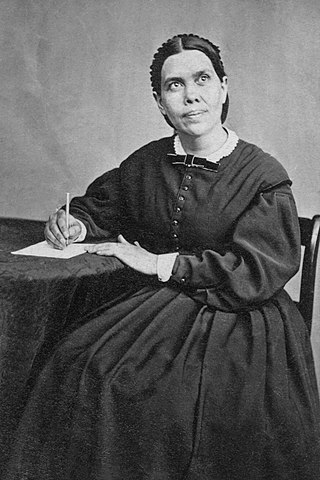Related Research Articles

The Seventh-day Adventist Church (SDA) is an Adventist Protestant Christian denomination which is distinguished by its observance of Saturday, the seventh day of the week in the Christian (Gregorian) and the Hebrew calendar, as the Sabbath, its emphasis on the imminent Second Coming (advent) of Jesus Christ, and its annihilationist soteriology. The denomination grew out of the Millerite movement in the United States during the mid-19th century and it was formally established in 1863. Among its co-founders was Ellen G. White, whose extensive writings are still held in high regard by the church.

Vegetarianism is the practice of abstaining from the consumption of meat. It may also include abstaining from eating all by-products of animal slaughter. A person who practices vegetarianism is known as a vegetarian.

Ellen Gould White was an American author and co-founder of the Seventh-day Adventist Church. Along with other Adventist leaders such as Joseph Bates and her husband James White, she was instrumental within a small group of early Adventists who formed what became known as the Seventh-day Adventist Church. White is considered a leading figure in American vegetarian history. Smithsonian named her among the "100 Most Significant Americans of All Time".

Loma Linda University (LLU) is a private Seventh-day Adventist health sciences university in Loma Linda, California. As of 2019, the university comprises eight schools and a Faculty of Graduate Studies. It is a part of the Seventh-day Adventist education system. The university is accredited by the WASC Senior College and University Commission (WSCUC). Its on-campus church has around 7,000 members.
Ellen G. White, one of the co-founders of the Seventh-day Adventist Church, was extremely influential on the church, which considers her a prophet, understood today as an expression of the New Testament spiritual gift of prophecy. She was a voluminous writer and popular speaker on health and temperance. Her teachings are preserved today through over 50,000 manuscript pages of her writings, and the records of others.
A blue zone is a region in the world where people are claimed to have exceptionally long lives beyond the age of 80 due to a lifestyle combining physical activity, low stress, rich social interactions, a local whole-foods diet, and low disease incidence. Examples of blue zones include Okinawa Prefecture, Japan; Nuoro Province, Sardinia, Italy; the Nicoya Peninsula, Costa Rica; and Icaria, Greece. The name "blue zones" derived simply during the original survey by scientists, who "used a blue pen on a map to mark the villages with long-lived population."
Francis David Nichol was a Seventh-day Adventist editor, of the church's main newsmagazine, and supervising editor of the Seventh-day Adventist Bible Commentary, author, and also chairman of the Ellen G. White Estate board of trustees, and considered the leading twentieth-century apologist for the prophetic ministry of Ellen G. White. In 1965, Walter Martin described him as "the most able Adventist apologist."

Hulda Hoehn Crooks was an American mountaineer, dietitian and vegetarianism activist. Affectionately known as "Grandma Whitney" she successfully scaled 14,505-foot (4,421 m) Mount Whitney 23 times between the ages of 65 and 91. She had climbed 97 other peaks during this period. In 1990, an Act of Congress renamed Day Needle, one of the peaks in the Whitney area, to Crooks Peak in her honor.
Adventist Health Studies (AHS) is a series of long-term medical research projects of Loma Linda University with the intent to measure the link between lifestyle, diet, disease and mortality of Seventh-day Adventists.

Loma Linda is a city in San Bernardino County, California, United States, that was incorporated in 1970. The population was 24,791 at the 2020 census, up from 23,261 at the 2010 census. The central area of the city was originally known as Mound City, while its eastern half was originally the unincorporated community of Bryn Mawr.
The Department of Nutrition is one of six departments at the School of Public Health at Loma Linda University. While nutrition was always a part of the curriculum at the university, the department was initiated when the School of Public Health began in 1963.

Nuteena was a vegetarian meat analogue made primarily from peanut meal, soy, corn, and rice flour. Its recipe was based on Nuttose, which John Harvey Kellogg created in 1896 as the first American meat analog. Nuteena was especially popular among Seventh-day Adventists, many of whom choose to be vegetarian based on the health message promoted by their church.

La Loma Foods, formerly named Loma Linda Food Company and Loma Linda Foods, and with products presently branded under the name Loma Linda and Loma, is a former food manufacturing company that produced vegetarian and vegan foods. It is presently an active brand of vegetarian and vegan food products produced and purveyed by the Atlantic Natural Foods Company of Nashville, North Carolina. Loma Linda Foods began operations in 1905 under the name The Sanitarium Food Company and was owned by the Seventh-day Adventist Church until 1990.

Harry Willis Miller was an American physician, thyroid surgeon and Seventh-day Adventist missionary. Miller was a vegetarian and pioneer in the development of soy milk.

Alfred Berthier Olsen was an American physician, Seventh-day Adventist and vegetarian.

Ulma Doyle Register was an American biochemist, nutritionist, Seventh-day Adventist and vegetarianism activist known for his research on Vitamin B12. He was chairman of the Department of Nutrition at Loma Linda University School of Public Health.

Esther Kathleen Keen Zolber was an American registered dietitian, Seventh-day Adventist and vegetarianism activist. She was president of the American Dietetic Association 1982–1983.

Phyllis B. Acosta was an American public health researcher best known for her research on inherited metabolic disorders and vegetarian diets. She was a pioneer in developing nutritional therapy for management of phenylketonuria.

Hans Diehl was an American physician and Seventh-day Adventist, best known for his advocacy of lifestyle medicine and whole food plant-based nutrition. He was the founder of the Complete Health Improvement Program (CHIP).
References
- 1 2 3 4 5 "Asheville Forum: Gary Fraser". Spectrum Magazine. 2019. Archived from the original on May 24, 2024.
- 1 2 "Gary E. Fraser, MBChB, PhD". Loma Linda University. 2024. Archived from the original on August 23, 2024.
- 1 2 "Gary Fraser". True Health Initiative. 2024. Archived from the original on May 22, 2024.
- ↑ "Dr. Gary E. Fraser MD". August 24, 2024. 2024. Archived from the original on August 24, 2024.
- ↑ "Gary E. Fraser". eMedEvents. 2018. Archived from the original on August 23, 2024.
- ↑ "Research Team". Loma Linda University Health. 2024. Archived from the original on February 24, 2024.
- ↑ Binkley, Jeff; Jensen, Gordon L. (2004). "Diet, Life Expectancy, and Chronic Disease: Studies of Seventh-day Adventists and Other Vegetarians". The American Journal of Clinical Nutrition. 79 (3): 525–526. doi:10.1093/ajcn/79.3.525a.
{{cite journal}}: CS1 maint: multiple names: authors list (link) - ↑ Oliver, Ansel (2018). "Loma Linda's longevity legacy". Loma Linda University. Archived from the original on August 30, 2024.
- ↑ Fraser, Gary E. (2019). "Learning More From the Adventist Health Study". Adventist Review. Archived from the original on August 30, 2024.
- ↑ Fraser, Gary E. (2018). "Why Snopes.com Was Wrong About Vegetarian Life Expectancy". Adventist Today. Archived from the original on May 21, 2024.
- ↑ Fraser, Gary E. (1999). "Refocusing the Adventist Health Message". Ministry. Archived from the original on August 24, 2024.
- ↑ Ness, Andy (2004). "Diet, Life Expectancy and Chronic Disease. Studies of Seventh-Day Adventists and Other Vegetarians". International Journal of Epidemiology. 33 (3): 620–621. doi:10.1093/ije/dyh157.